Caretakers
Host: Kalyeeda Station
Written by Barbara Camp
We often describe station work as seasonal. Up here in the Kimberley we only have two – the wet and the dry. Bet you can’t guess the major weather difference between them.
When working cattle the majority of the hard yakka is done in the more temperate dry season. The mercury occasionally dips down to a balmy 30 through the day and – more importantly- the humidity does not leave you (and the animals) sweating out more than you can drink in. The dry, dusty days stretch on and each are filled with tough work and activity. There’s never enough hours in the day or days in the week through the dry and it passes all too quickly in a flurry of activity.
Then comes the wet.
When you’re talking to someone new to the Kimberley you often talk about ‘surviving’ a wet season up here. Often it does seem like a real battle. The heat just increases and then comes the unbearable build-up before a storm. Following that comes the glorious and terrifying power of a true wet-season downpour and the torrential, never ending insidious monsoonal days that you catch on the edge of a cyclone. We all pray for rain (but not too much…) but when it arrives it can leave you unprepared.
This is the time of year when most of the staff left exhausted after a season of 4am starts and long days in the sun take their holidays. But station life doesn’t just stop because you’re tired. Animals still need checked on and fed. Grass still grows. Machinery still needs maintained and all of the jobs that have been put off through the busy dry can finally be caught up on. So while the main crew sneak off for a well-earned break in steps one of the most interesting roles on the cattle-station payroll – the caretakers.
Being a cattle-station caretaker is a pretty diverse role. We have had the position filled by a range of colourful characters throughout the years who have all bought different attitudes and skills to the job. From young foreign backpackers to old retired tradies. Machinery operators to school teachers. The job appeals to a diverse demographic range.
The number one role is – as the name implies – take care of the necessary. Usually that means making sure the generators keep running and that the animals are fed. On top of that and depending on the scope of the caretakers and the wildness of the weather there a whole range of other activities that can happen.
From slashing the grass and scrub that seems to get out of control daily to fixing the machinery that has had a hard and busy season. There’s always dogs to be looked after and usually a whole tribe of rapidly growing poddy calves. There is always plenty to do. If you can summon the inclination to leave the air-conditioning and venture into the humid, bug laden world, that is.
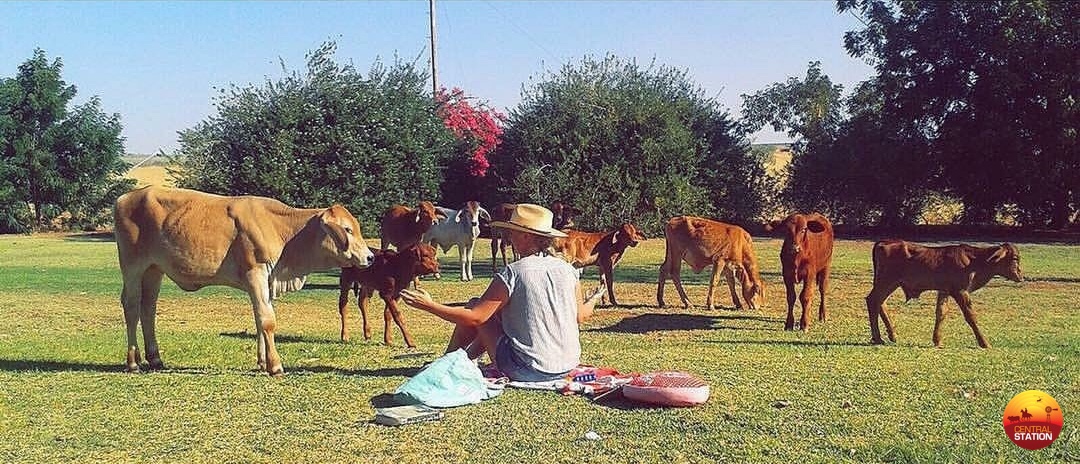 Spending time with friends in the Wet.
Spending time with friends in the Wet.
In the Wet nature attempts to reclaim its own and things can get wild pretty quickly if you don’t keep on top of things. Work is generally done very early in the morning before the sun rises too high. Any excursions from the main homestead require careful planning and several back-up plans.
Generally speaking we try to employ a couple of people for safety. The theory goes if something happens to one person the other will be there to help. I have been out at Kalyeeda on my own before when the generator broke down. That was a nerve-wracking day as I attempted to diagnose the problem and fix it via instructions over the phone.
That leads us to another problem – the extremes of weather have left us without any means of communication on more than one occasion. Another year saw myself and husband James without phones or internet for three days and totally unaware that a huge tropical low had moved in to the river’s catchment above us and we were about to be flooded in. The first we were aware was when – puzzled as to why we had not contacted her to move cattle off the soon to be flooded land – our chopper mustering pilot flew in to check on us.
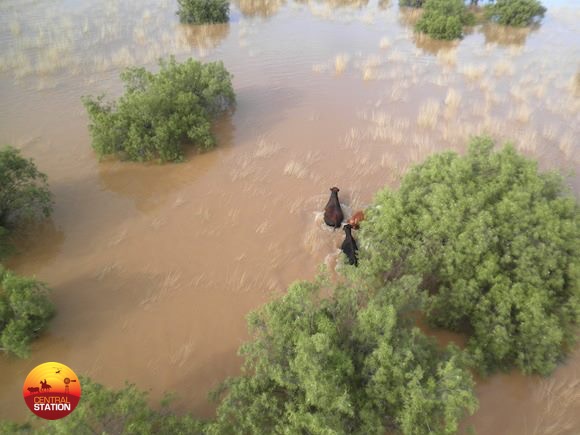 Moving cattle from flooded areas requires a chopper.
Moving cattle from flooded areas requires a chopper.
Kalyeeda’s homestead essentially sits on top of a sand ridge. We are on the edge of the Fitzroy River which will burst its banks in a good year and flood the surrounding countryside. When the rain comes you can be stranded on that spit of land – no chance of getting out and about to do anything unless you have several strategically placed tinnies and utes.
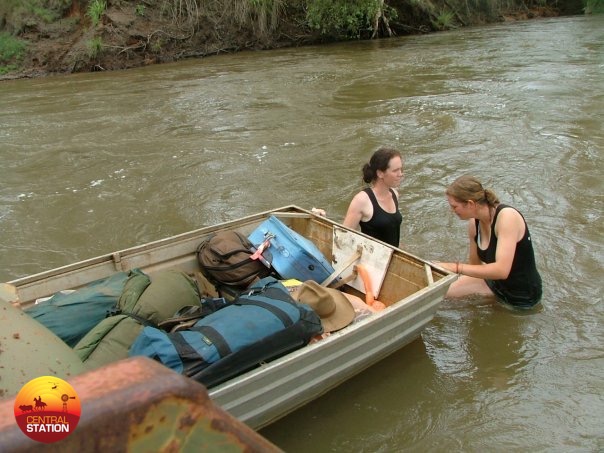 Getting in and out to town can be challenging.
Getting in and out to town can be challenging.
This means you can be spending a LOT of time in a very small area potentially without any contact with the outside world. It can be boring. Especially in the hours when the generator has to go off to rest the motor and you are forced to amuse yourself outside. Cabin fever can descend and I will not lie – in the wet season things get weird.
Nakedness is a common theme. It seems the urge to strip off and tend to the garden in the nude is unavoidable. More than once a caretaker has been busted by an unexpected returning crew member heading out to the washing-line in the altogether (this has left lasting impressions on many a young chopper pilot out to move some cattle for us – especially if said caretakers were of an older era).
Other couples have taken the bit between their teeth and started a great big project. James went on a beer-brewing jag one year which was fun until the bottles started exploding. In a season past we came back to find a beautiful veggie garden bursting with tomatoes and sweet potatoes. One year the whole shed – floor and all – has been painted. Other brave souls have tackled the detritus of broken and useless junk put in storage’ on top of the cold rooms, or the freezer has been stocked with pre-made meals to last for weeks. Or the other extreme can happen. If no one can get into town to get food you can find yourself eating some rather creative meals whipped up with whatever’s left in the pantry. Have you ever tried sausage satay? It sits on the guts like a lead balloon FYI.
Sometimes though, people turn to less wholesome ways to entertain themselves. You’re trusting your home to the care of strangers and sometimes that can be abused. Sometimes the place is just a bit unkempt or things have been damaged. There have been issues in the past with alcohol abuse and I don’t mean our exploding ginger beer. James will still tell the story of arriving after one year to find the caretaker drunk as a skunk sitting on a half-finished slab of beer in the cold room to escape the heat. Another time we found that all of the morphine had been raided from the RFDS box.
Usually the problems are a lot more mundane. There can be periods where you are stuck at the homestead for what seems like forever. This can make or break some relationships. We’ve come home before to find couples who have broken up in the weeks they have been alone at the station and are desperate to get into town and never see each other again. Being cooped up with just one other soul can really show you another side to them, especially when things go wrong and you only have that one other person to rely on. But for every sour, boring moment there have been some mad adventures.
Driving around and about even as far as our airstrip can be a mission if the rain has come down hard and the methods of transport have become a bit more rustic. In one particular wet season we were caught by surprise by just how quickly the water rose. We were stranded on our sandy homestead island with no way to drive down to start the pump for water (how ironic) or to get the 20L jerry of fuel down there to feed it. It is a very odd experience to punt down what was once a road in an old tinny complete with a hastily silicone-d up hole in the side using a rake and a shovel as oars. This is the kind of creative thinking that caretaking brings out in you.
Another year we threw our deaf little spaniel dog on the back to the ute to go and check on the big poddies in a paddock a bit further from the homestead. We don’t usually take her around but she had become quite clingy with just us for company. She fell off the back and we lost her. It’s not great when you find yourself standing on the back of a ute calling out for a deaf dog in chest-high long grass. Even worse when you find her and realise she’s broken her leg and the roads are too wet to get into town. That poor dog sported a pretty interesting bandaging job for a few days.
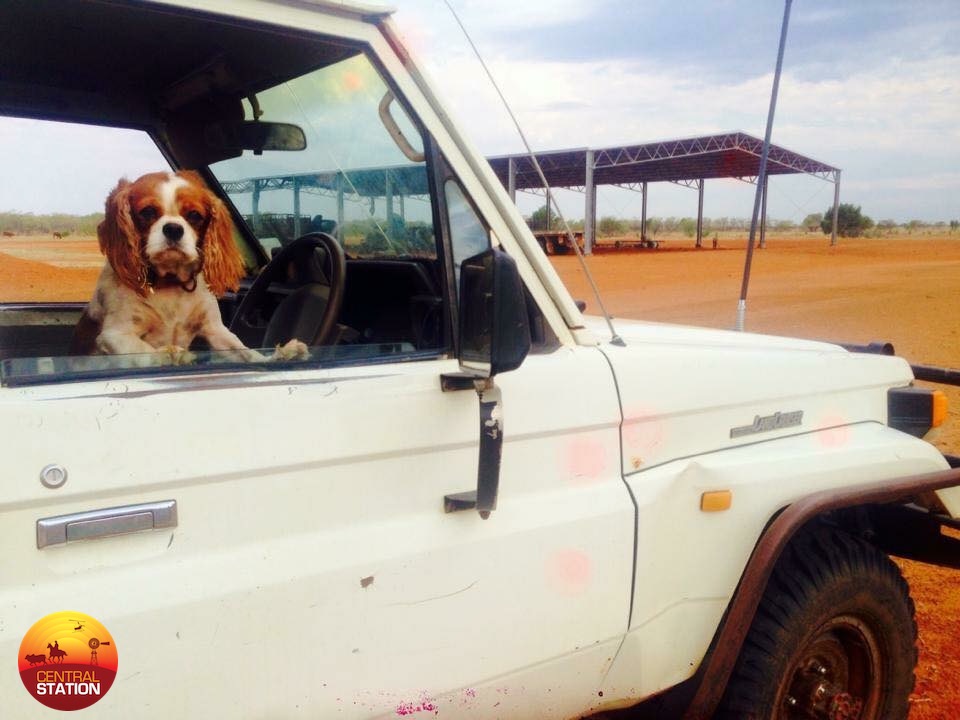 Lesson learned: keep small, deaf dogs inside the ute at all times.
Lesson learned: keep small, deaf dogs inside the ute at all times.
For all the tough times it’s worth it because you’re looking after something pretty special at a time of year where nature really struts her stuff. For every story I have of things going wrong there are a thousand other memories of the awesome scenery, the drama of the storms and the weird and wonderful things you suddenly find yourself doing. For all the hard times, a bit of time out bush in the wet will leave memories you can’t replace.
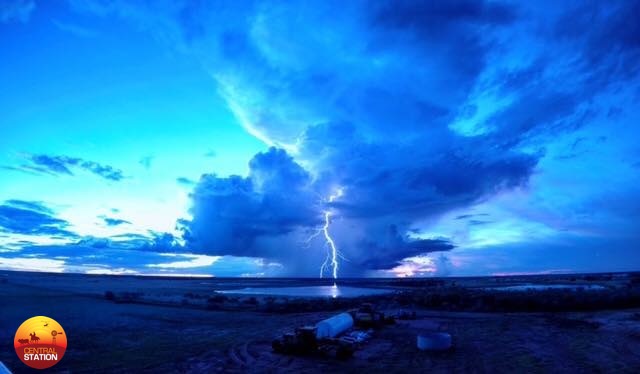 Who needs TV when nature puts on a show like this every evening?
Who needs TV when nature puts on a show like this every evening?
